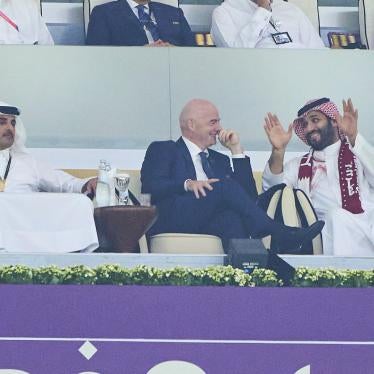(Beirut) – Saudi authorities killed hundreds of migrants at the Saudi-Yemen border in what may amount to crimes against humanity in 2023, even as they spent billions of dollars to improve their image, Human Rights Watch said today in its 2024 World Report. The government also sentenced people to decades-long prison terms or death for social media activity, in addition to subjecting them to unfair trials and abusive detention practices.
“The Saudi government uses its Public Investment Fund to expand its influence and fund lavish sporting events in an attempt to obscure how it systematically violates human rights,” said Joey Shea, Saudi Arabia researcher at Human Rights Watch. “The billions of dollars it invests should not insulate it from scrutiny over its egregious rights record, including what may amount to crimes against humanity.”
In the 740-page World Report 2024, its 34th edition, Human Rights Watch reviews human rights practices in more than 100 countries. In her introductory essay, Executive Director Tirana Hassan says that 2023 was a consequential year not only for human rights suppression and wartime atrocities but also for selective government outrage and transactional diplomacy that carried profound costs for the rights of those not in on the deal. But she says there were also signs of hope, showing the possibility of a different path, and calls on governments to consistently uphold their human rights obligations.
Saudi border guards have killed at least hundreds of Ethiopian migrants and asylum seekers who tried to cross the Yemen-Saudi border between March 2022 and June 2023. If committed as part of a Saudi government policy to murder migrants, these killings would be a crime against humanity.
Crown Prince Mohammed bin Salman has consolidated economic power in Saudi Arabia via the country’s US$700 billion sovereign wealth fund, known as the Public Investment Fund (PIF), over which he exercises unilateral decision-making with little transparency or accountability.
In June, the announced merger between the PIF and the Professional Golfers’ Association (PGA) effectively enabled the Saudi government’s efforts to “sportswash” its egregious human rights record by placing the Saudi government in an unprecedented position of influence and control at the top levels of professional golf. The agreement is opaque, has been subject to scrutiny, and does not appear to be finalized.
Social media users are being increasingly targeted by Saudi authorities and punished with decades-long sentences and even death for exercising their right to free expression. The country’s notorious Specialized Criminal Court convicted a retired teacher, Muhammad al-Ghamdi, of several criminal offenses related to peaceful social media activity in July and sentenced him to death. Judges and prosecutors also use vague cybercrimes laws to crack down on people suspected of having sexual relations outside marriage.
Women’s rights defenders, including Loujain al-Hathloul, remain under a travel ban and a suspended prison sentence that allows Saudi authorities to return them to prison. Other rights activists remain arbitrarily imprisoned on charges related to exercising their rights to free expression.
Saudi Arabia also uses overbroad terrorism law provisions to suppress dissent and target religious minorities. Sabri Shalabi, 66, an Egyptian doctor, is serving a 10-year sentence following what appears to have been an unfair trial on terrorism charges in retaliation for a work-related dispute.
In January, Saudi Arabia successfully extradited Hassan al-Rabea from Morocco and sought to try him on terrorism charges. This follows Saudi’s targeting of other members of al-Rabea family for alleged protest-related and terrorism offenses, with one facing a death sentence. In June, Saudi authorities executed two Bahraini Shi’a men following what Amnesty International described as a “grossly unfair trial” on terrorism charges.
Saudi authorities continue to apply the death penalty even for nonviolent crimes. In March, Saudi authorities executed Hussein Abu al-Kheir after convicting him of a nonviolent drug crime amid allegations of torture and a forced confession.
Saudi authorities continue to impose the abusive kafala (sponsorship) system for migrant workers. Despite recent reforms, kafala continues to underpin workers’ vulnerability to abuses, including forced labor.









